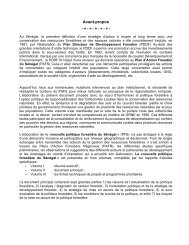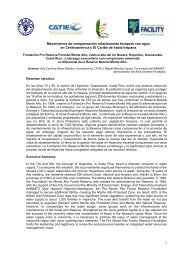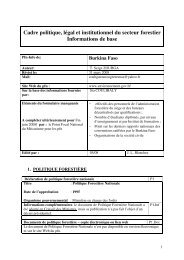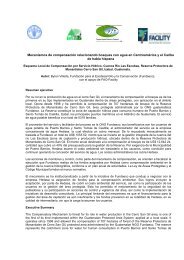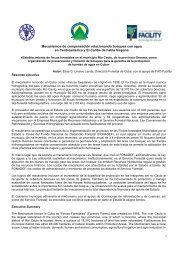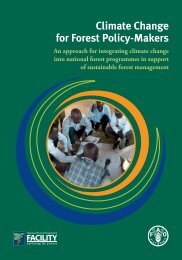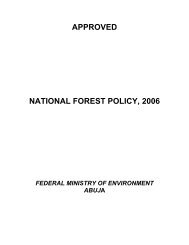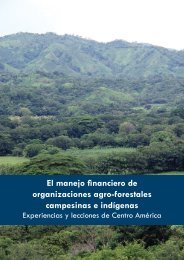2010 Progress Report â Draft - NFP Facility
2010 Progress Report â Draft - NFP Facility
2010 Progress Report â Draft - NFP Facility
Create successful ePaper yourself
Turn your PDF publications into a flip-book with our unique Google optimized e-Paper software.
<strong>2010</strong> <strong>Progress</strong> <strong>Report</strong>Cambodia:Promoting stakeholder participation in national forest policy dialogueIn 2008, the Forestry Administration, together with forestry stakeholders, embarked on aprocess to develop their national forest programme (<strong>NFP</strong>) as a significant step towards SFM.This was done with financial and technical support from different development partners,including the <strong>NFP</strong> <strong>Facility</strong> and Denmark. The <strong>NFP</strong> in Cambodia is a forestry strategic frameworkguiding forestry development until 2030, aimed at meeting local, national and global needs bymanaging forest resources in a sustainable manner for the benefit of present and futuregenerations. The <strong>NFP</strong> includes six specific programmes of forest demarcation, national forestmanagement and conservation, forest law enforcement and governance, community forestry,capacity building and research, and sustainable forest financing. The document was adoptedby the Royal Government of Cambodia on the 18 th October <strong>2010</strong> and launched for fullimplementation on the 29 th December <strong>2010</strong>.The development of the <strong>NFP</strong> in Cambodia has demonstrated good multi-stakeholderparticipation. Six consultation workshops were organized in 2009 with support from the<strong>Facility</strong>. The workshops were attended by a wide range of stakeholder groups at national,regional and provincial levels from throughout the country. The wide and diverse range ofstakeholder groups involved throughout the <strong>NFP</strong> identification and formulation processhighlighted a fundamental need for communication and extension to reach all stakeholders soas to optimize active participation. Monitoring and review of the process, as well as transparentand systematic information, sharing are keys to success.The approach and design of each consultation workshop was well prepared, continuallyadapted and improved. This allowed the organizing teams to collect different views andfeedback, and to incorporate these into the final draft of the <strong>NFP</strong> document. Bringingstakeholders together for such a major undertaking was a significant achievement inCambodia. The development of working relationships, trust building, confidence raising andcapacity development, were all great challenges and took significant time to evolve.Country CoachingIn <strong>2010</strong> the <strong>Facility</strong> engaged 20 different staff (“coaches”) to provide support to the 70 Partner Countries and 4Regional Partners (see the list of coaches in Annex II). Except for security concerns in a few countries and some“non-responding” countries, all partners have been visited at least once in <strong>2010</strong>. As in the past, to reduce costs,some Focal Points and key stakeholders were periodically invited to a neighbouring partner country or to aregional meeting to meet with the coach, and to discuss the progress of the nfp in the country.As in previous years, coaches spent between 50% and 75% of their time on policy backstopping. Overall, anestimated 55% of available coaching time was spent on policy backstopping and advisory services, which ischarged to “Country Support”.“Nfp’s for All” TrainingIntroductory Training Module (ITM)The ITM under the “Nfp’s for All” initiative is part of the Country Support provided to Partner Countries and wasused again in <strong>2010</strong> during the launching workshop for the 2 nd <strong>Facility</strong> Agreement (China, Nicaragua, Senegal,Mozambique and Sudan), and for workshops in countries which wanted to re-start their nfp process (Burundi,Rwanda, Nepal and Mongolia). The purpose of the 2 or 3 day workshop is to increase country ownership of thenfp, to enhance broad stakeholder participation and to build national capacity for nfp implementation at thecountry level. Also included are Result Based Management and OIMES training.In these workshops, which are chaired by the <strong>NFP</strong> Focal Point or the Director of the Forestry Department, all key16



